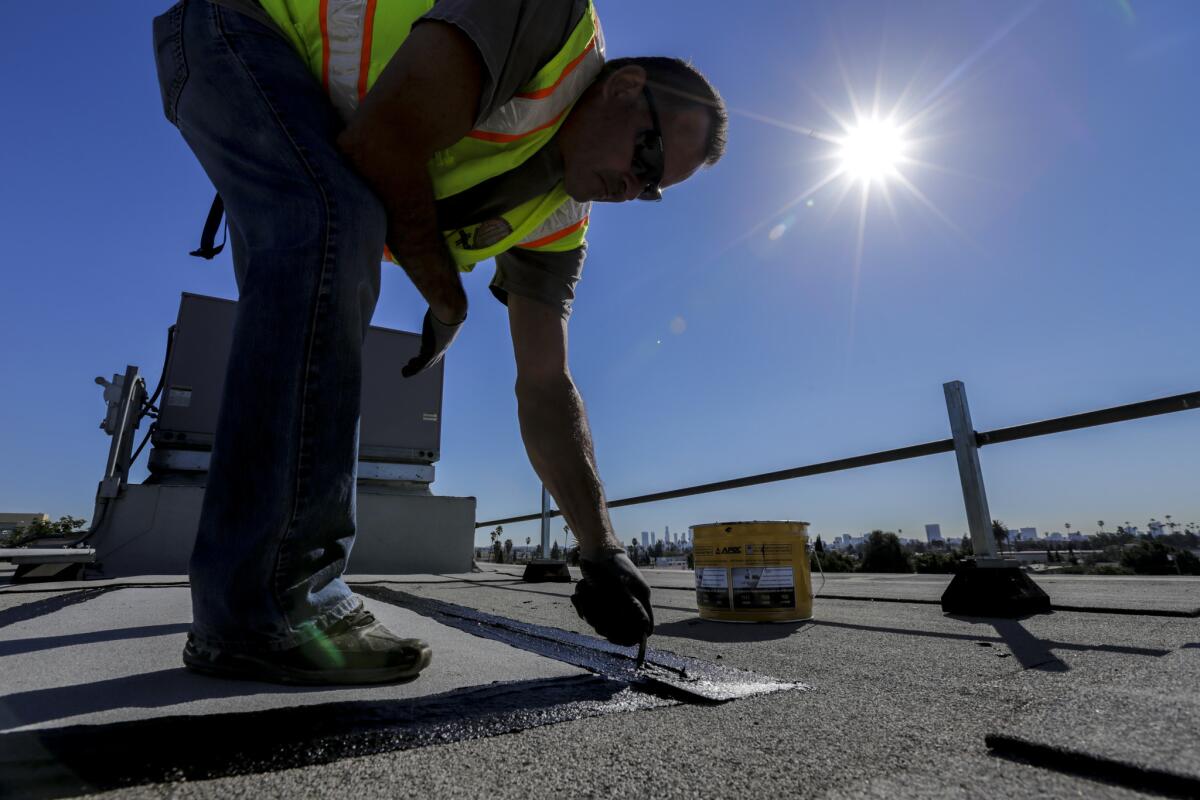The race between El Niño, and getting the roof fixed at your kid’s school

Rick Rodriguez, a roofer for Los Angeles Unified School District, fixes a rain-related leak on the roof of Le Conte Middle School’s auditorium on Wednesday, Feb. 3.
- Share via
Gym roofs leaked. Water dripped onto an auditorium stage. Storm drains clogged.
Los Angeles Unified schools made 176 rain-related service requests on Jan. 31 and Feb. 1, after the latest El Niño rains soaked Southern California. By Friday, the district’s backlog had grown to 1,167 unresolved rain-related issues.
Most of these service calls stem from cracked, old roofs that let in the rain, so one solution is to replace them. The Board of Education is scheduled to vote Tuesday on whether to approve spending $4.1 million of bond money to replace the roofs at five schools.
Every time El Niño dumps rain on the city, dozens of L.A. Unified schools feel the impact of old architecture and outdated roofs.
Although employees are working overtime and the district is outsourcing some projects to contractors, the nation’s second-largest school district can address only 40 to 50 of these service calls a day, said Roger Finstad, the district’s director of maintenance and operations.
After a few weeks pass and the next storm hits, the leaks repeat. There simply aren’t enough resources to fix them all on time, Finstad said. It is possible that some problems were reported more than once and have been resolved, but haven’t been removed from the log, he said.
With more than 13,000 buildings in L.A. Unified, most classrooms are not leaking. Still, each time it rains, hundreds of students might be learning while listening to the background noise of dripping water.
Last week, it wasn’t just the rain. Winds worsened the situation, and throughout the week, schools continued to call in complaints. There were more than 80 rain-related requests from Tuesday through Friday for issues including further leaks and a shingle that blew off the roof of Coldwater Canyon Elementary.
Why are some L.A. schools so prone to leakage? Many date back to the early 1900s, with roofs that have been replaced more recently but are still decades old.
Take Le Conte Middle School in Hollywood. The Renaissance Revival-style campus was built in the 1920s and is one of the district’s beauties. The roof is 20 to 25 years old, according to district spokeswoman Elvia Cano.
On Wednesday morning, district roofer Rick Rodriguez smeared tar around a cap sheet that he had put on top of a crack about two yards long that was letting water fall onto the auditorium floor inside.
“This repair will last an easy five years,” Rodriguez said.
Supervisors decide which problems to fix based, in part, on the safety and health impact to students and the need to vacate an area because of a leak, Finstad said. Puddles forming on the playground, for example, might fall to the bottom of the priority list.
Staff also are working overtime during the rainy season to minimize damage. A maintenance employee preempted floor damage at Le Conte Middle School by putting a bucket under the leak on Jan. 31. Plant managers and maintenance staff visited school sites that Sunday to make sure their campuses were safe and to report any damage.
Because it’s difficult to address all the leaks, the district tries to preempt as much damage as it can.
Since 2012, the district has approved or begun construction on 48 roofing projects worth $26.5 million. In the fall of 2015, Finstad expedited 10 roofing projects worth $6.1 million when he found out that El Niño would be hitting Los Angeles hard this year. He was still dealing with a series of scorching classroom days, with hundreds of teachers complaining that the air conditioning wasn’t working.
Other roof-replacement projects require a longer approval process, but even the expedited projects won’t be done until April or May because of the review and contract bidding process, Finstad said. El Niño will be mostly over by then.
“If I could start work at just my own schedule and whim, everything would be done right now,” Finstad said.
But he can’t, so those 10 are still in progress, and he hopes he’ll get funding Tuesday for the next round of projects.
Reach Sonali Kohli on Twitter @Sonali_Kohli or by email at Sonali.Kohli@latimes.com.
ALSO
The real challenge for Los Angeles’ new football stadium: Everything around it
Nearly half of new driver’s licenses in California went to immigrants here illegally
No Chipotle for lunch today: Its U.S. restaurants shut for a food safety meeting
More to Read
Sign up for Essential California
The most important California stories and recommendations in your inbox every morning.
You may occasionally receive promotional content from the Los Angeles Times.











